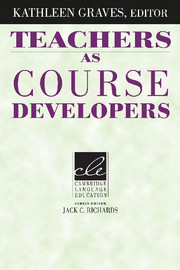Book contents
- Frontmatter
- Contents
- Contributors
- Series editor's preface
- Preface
- Acknowledgments
- 1 Teachers as course developers
- 2 A framework of course development processes
- 3 Designing workplace ESOL courses for Chinese health-care workers at a Boston nursing home
- 4 Designing a seventh-grade social studies course for ESL students at an international school
- 5 Designing an EAP course for postgraduate students in Ecuador
- 6 Designing a writing component for teen courses at a Brazilian language institute
- 7 Planning an advanced listening comprehension elective for Japanese college students
- 8 A curriculum framework for corporate language programs
- Further reading
- Index
6 - Designing a writing component for teen courses at a Brazilian language institute
Published online by Cambridge University Press: 18 December 2009
- Frontmatter
- Contents
- Contributors
- Series editor's preface
- Preface
- Acknowledgments
- 1 Teachers as course developers
- 2 A framework of course development processes
- 3 Designing workplace ESOL courses for Chinese health-care workers at a Boston nursing home
- 4 Designing a seventh-grade social studies course for ESL students at an international school
- 5 Designing an EAP course for postgraduate students in Ecuador
- 6 Designing a writing component for teen courses at a Brazilian language institute
- 7 Planning an advanced listening comprehension elective for Japanese college students
- 8 A curriculum framework for corporate language programs
- Further reading
- Index
Summary
In this chapter, Maria Estela Pinheiro Franco, a teacher with more than twenty years' experience in EFL and elementary education, describes the development of a writing supplement to be used in conjunction with the regular courses for teens and preteens at the language institute where she is a branch supervisor in São Paulo, Brazil. Pinheiro started out as a kindergarden and primary school teacher. She then went on to open her own language school, which she ran for five years. She joined Associação Alumni in 1983, first as a teacher and later as supervisor of the teen and preteen programs. Pinheiro draws on her knowledge of her adolescent students, her understanding of materials development, and her experience with writing as a process to produce the writing supplement. Because teacher development is one of her responsibilities as a course supervisor, one aspect of course development she describes is training other teachers to use the material. The Appendix contains all of the material used in the writing supplement for the Teen 6 level. [Note that the space for students to write has been condensed.]
The course development focuses for this chapter are: selecting and developing materials and activities, and organization of materials and content. Consider the following questions as you read:
What were Pinheiro's main considerations in developing the writing supplement?
What factors does she take into account in deciding how to organize and sequence the activities?
- Type
- Chapter
- Information
- Teachers as Course Developers , pp. 119 - 150Publisher: Cambridge University PressPrint publication year: 1996
- 1
- Cited by



